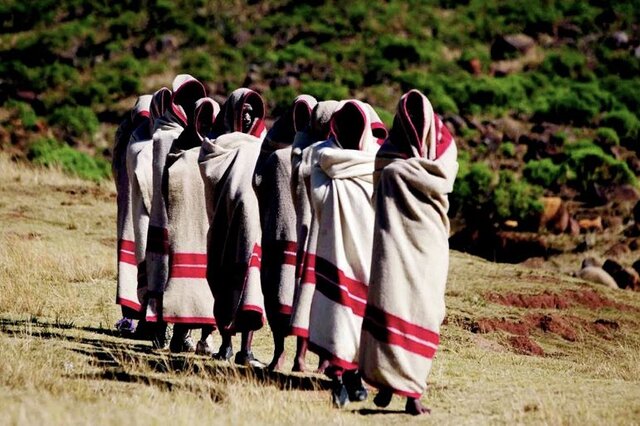Anthony Diala, University of the Western Cape
It’s nearly winter in South Africa, which means the opening of winter initiation schools is approaching. These rituals mark a transition to adulthood and are deeply ingrained culturally. But they’re often the subject of headlines because of deaths and safety issues.
Now government is looking to tighten its enforcement of the Customary Initiation Act of 2021. We asked Anthony Diala, a scholar of African customary law, to break down the issues.
What is traditional initiation in South Africa?
Traditional initiation is a cultural rite of passage. Millions of South Africans observe varying forms of initiation rites to mark significant events such as birth, puberty, adulthood, marriage and death. Initiation reflects important ancestral ties, values and cultural identity.
These rites vary from community to community. Male initiation among the Xhosa people of the Eastern Cape province, for example, includes circumcision and seclusion in specially constructed lodges away from communities. Initiates learn survival skills, cultural traditions and social responsibilities from tribal elders. Some training involves rituals and dietary restrictions.
Female initiation prepares girls for social roles as wives, mothers and aunts. Initiation ceremonies by the Bantwane of Mpumalanga province, for example, teach appropriate social and sexual behaviour for very young girls through a six-week rite of passage. They include real and symbolic circumcision. (Symbolic circumcision means a slight cut or “nick from a trained health worker” rather than full circumcision.)
In traditional communities, initiation to adulthood reflects intimate connections between farming practices, seasonal changes and ancestral rites. It reinforces the relationship between human development and agricultural productivity. So, it typically coincides with critical farming seasons and crop cultivation cycles.
Why are initiation practices regulated?
From my research on the interaction of legal systems, I know the state is mandated to protect public wellbeing. The Customary Initiation Act of 2021 asserts the state has a “duty to set norms and standards” for initiation practices. There are good reasons for this.
Initiation practices are sometimes accused of violating bodily autonomy and other human rights. There’s concern about the abduction of boys into initiation schools, questionable consent of initiates, the risk of physical injury through negligence, poor hygienic conditions and unqualified traditional practitioners.
Since 1995, hundreds of male Xhosa initiates have died from complications. Thousands have suffered penis amputations due to practitioner incompetence.
This health risk is the strongest argument for state regulation. But criticisms of initiation schools also reflect negative attitudes towards indigenous laws.
Some Africans condemn their own indigenous practices because they have embraced western culture and its notions of civilised behaviour. The Europeans who colonised South Africa used Christianity, Eurocentric education and new systems of work to alter the behaviour of their subjects.
They created new cultural values for Africans, who went on to replicate these values. South Africa adopted a western-style constitution and uses its foreign values to regulate indigenous practices.
What does the new regulation propose?
The Department of Cooperative Government and Traditional Affairs recently invited comments on Draft Customary Initiation Regulations.
These will regulate the enforcement of the Customary Initiation Act by clarifying the roles of the National Initiation Oversight Committee and provincial initiation coordinating committees.
The Customary Initiation Act itself demands the registration of initiation schools and traditional surgeons. It requires written consent from parents or legal guardians for minors, and forbids initiation for children under 16. It even restricts initiation seasons to school holidays.
How does regulation reflect a clash between customary and common law?
Indigenous laws cherish communal welfare. Common laws prioritise individual wellbeing. While indigenous laws emerged in agrarian (farming) settings, the laws imposed by European colonisers developed in industrial societies. The clash of cultures has been intense in the courts.
European colonial judges refused to enforce customs they considered contrary to public policy, natural justice, equity or good conscience. This enabled them to “civilise” African behaviour.
Today, the “civilising” role is performed by Africans themselves using the constitution’s bill of rights.
The Customary Initiation Act wants to transform initiation practices to reflect the values in the bill of rights. Sections 15, 30-31, 39(3) and 211 of the constitution recognise customary law and mandate courts to apply it. But the bill itself emerged from foreign ideas.
Specifically, it came from the Universal Declaration of Human Rights of 1948. Western powers adopted this with zero input from indigenous Africans.
So, state regulation of initiation practices continues to make European laws culturally superior to indigenous African laws.
What’s the way forward?
Obviously, the state is obliged to protect everyone’s human rights, including those of initiates. But traditional communities also have a constitutional right to practise their culture without undue state influence.
Therefore, a balance needs to be struck between protecting teenagers and preserving culture.
In striking this balance, everyone must keep in mind the agrarian origins of initiation rites and the colonial origins of the modern South African state. In the precolonial era, families and tribal leaders had the duty of protecting initiates. There is no reason why this should not continue.
State regulation should be limited to establishing minimum health standards and providing training for traditional practitioners. In my view, it should leave age participation guidelines and informed consent to traditional authorities. This would be a sign that the state respects indigenous law as a legitimate source of law in South Africa.
To assuage health concerns, some initiation rites can be performed symbolically. Traditional practitioners can be trained to incorporate modern health knowledge without compromising cultural authenticity. This will improve health standards. Hopefully, it will also reduce negative perceptions of initiation practices.![]()
Anthony Diala, Professor of African legal pluralism and Director, Centre for Legal Integration in Africa, University of the Western Cape
This article is republished from The Conversation under a Creative Commons license. Read the original article.
Follow African Insider on Facebook, Twitter and Instagram
Picture: X/@NalaThokozane
For more African news, visit Africaninsider.com
Source: The Conversation



